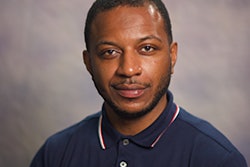An elementary school classroom activity called the “reading rainbow,” which highlighted the day in the life of various careers, sparked Dr. Maria Rosa’s desire to pursue marine biology. One of the books she had read focused on a female marine biologist who worked with sea turtles both inside and outside the lab.
In combination with her love of water and newfound knowledge, Rosa saw oceanography as an ideal career path.
“That kind of helped guide me in terms of seeing the different possibilities,” says Rosa, who is the George and Carol Milne assistant professor of biology at Connecticut College. “That it could be something that I really liked and then something that I was good at in terms of my imagination and asking questions and trying to answer the questions.”
Rosa attended the City College of New York for her undergraduate degree, where she studied biology.
As a first-generation college student, she was left with many unanswered questions and lacked some understanding about college life, such as the importance of attending office hours. Rosa spent a lot of her time saving for graduate school, which hurt her grades.
However, she received a paid research grant that allowed her to gain experience working in a lab.
“Having that support early on has been very helpful,” says Rosa. “Because those were challenges, not knowing where the support was, not knowing about all these fellowships that I never applied for because I didn’t know they existed, so that’s what’s made things harder for me.”




















